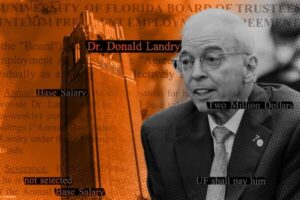
Teaching and Learning Can’t Happen Under These Circumstances
I’m hoping everyone working in higher education is aware of the recent events at Texas A&M, where a student recording of an exchange with an instructor ultimately led to the dismissal of the instructor and the demotion of both the department chair and college dean that had backed the instructor’s classroom autonomy.
I looked at the big-picture academic freedom implications in a newsletter for the Center for the Defense of Academic Freedom, where I note that one of the people who initially defended the instructor’s autonomy was Texas A&M president Mark Welsh, who told the student complainant that firing the instructor was “not happening,” only to reverse course after a storm of right-wing outrage and political pressure rained down.
The instructor was a model of professionalism—watch the video yourself if you don’t believe me—and yet this student set out with a plan deliberately engineered to get the instructor fired, and it worked.
I’ve been thinking a lot about this student, about what has to happen for a young person to enter college seeing something like this—personally targeting and destroying another human being who is just doing their job—as what they want to spend their college years doing.
It is an act of great cruelty, and yet I must imagine this person does not see themselves as cruel. I’m sure they somehow have justified this cruelty, but there is simply no justification for it. If they are not cruel, what is left? It becomes an act of madness.
One of my favorite things about teaching college-age students is that they are ready for the whole deal, adults who have volunteered themselves for a potentially transformative experience. Look, I’m not naïve about the more transactional mindsets that students bring to college, but it always seemed to me that at least the potential for something more meaningful, more lasting, was always present.
I loved teaching because I knew that this was the goal, even as I only had vague notions of how it could be achieved. And when it was achieved for a particular student, it was clear that this was not necessarily replicable on a mass scale using the same approach. That difficulty is fascinating. The tension in not knowing if it can be pulled off, but trying anyway, was energizing, sometimes even intoxicating. This is very hard, but it is also very worth doing.
At least I think so.
Sometimes, when things were going well during a class, I would step outside myself for a moment and think, Look at all these people! Each one of them was a person, and together we were collectively being human, at least for a moment. What could be better?
Here we are. I honestly don’t know how anyone can teach and learn under the present circumstances. For the bulk of my career, I worked in places where my political and religious views were out of sync with those of most my students, but I could not imagine being afraid of them exacting punishment or revenge on me for the mere fact of these views. My students were fundamentally open and curious, not without convictions by any means, but also essentially trusting that everyone involved in the educational enterprise had their best interests at heart unless proven otherwise.
Now, it seems prudent to assume someone is out to get you, because it only takes one person of bad faith armed with a smart phone and ill intent to destroy your career. There is an essential fragility, a brittleness to this student who took down their instructor that makes them impossible to work alongside. There is no potential for community. Even if they are only one in a thousand, the whole deal is spoiled.
In my course policies, I would often share a quote from Cornel West regarding the project I hoped the students and I were embarking on together.
“I want to be able to engage in the grand calling of a Socratic teacher, which is not to persuade and convince students, but to unsettle and unnerve and maybe even unhouse a few students, so that they experience that wonderful vertigo and dizziness in recognizing at least for a moment that their world view rests on pudding, but then see that they have something to fall back on. It’s the shaping and forming of critical sensibility. That, for me, is what the high calling of pedagogy really is.”
There are places today where it seems like even articulating such a philosophy, let alone attempting to put it into practice, would disqualify me from the classroom.
As I was first working on drafting this column, I saw the news of the violent death of another young person who got his start as an antagonist to college professors and became quite wealthy and powerful primarily by calling down harassment on others—harassment that caused them to fear for their jobs and even sometimes their lives.
He had a wife and two children under 4 years old. More madness.
I honestly don’t know what to make of any of this. I am in a moment of Dr. West’s “pudding.”
Maybe tomorrow more helpful thoughts will come.
Source link



